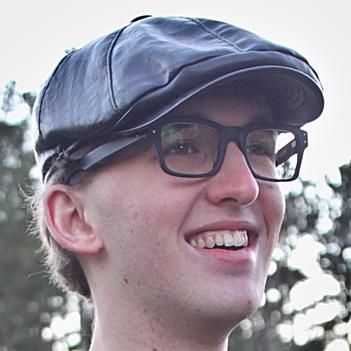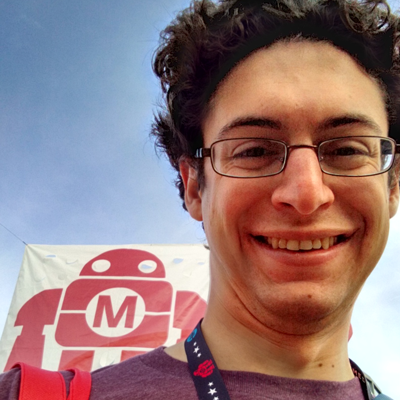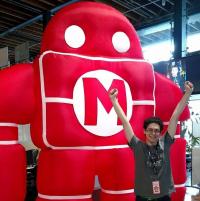New Open Source Program Director Supports Students' Passions at the Rochester Institute of Technology
 Justin W. FloryThe Rochester Institute of Technology (RIT) is well-known for its work in open source software through FOSS@MAGIC. In April 2014, RIT started to offer a minor in free and open source software. Students work on several different open source projects in their GitHub organization. One of the courses in the minor, Humanitarian Free and Open Source Software Development, has students work with the One Laptop per Child XO laptops. Students create games that help teach New York and Massachusetts fourth grade math curriculum.
Justin W. FloryThe Rochester Institute of Technology (RIT) is well-known for its work in open source software through FOSS@MAGIC. In April 2014, RIT started to offer a minor in free and open source software. Students work on several different open source projects in their GitHub organization. One of the courses in the minor, Humanitarian Free and Open Source Software Development, has students work with the One Laptop per Child XO laptops. Students create games that help teach New York and Massachusetts fourth grade math curriculum.
Dan Schneiderman is the new head of the FOSS@MAGIC program at RIT. Schneiderman is responsible for planning, implementing, and reporting on the overall direction of the FOSS@MAGIC initiative in concert with the core team of the MAGIC Center at RIT. He also organizes hackathons, code challenges, media events, corporate relations with the FOSS community, and other events. Schneiderman graduated from RIT in 2012 and helped back the maker movement in Rochester with events such as BarCamp ROC and the Rochester Mini Maker Faire.
We had a chance to interview Dan about his new position and some of his plans for the open source and maker communities at RIT, Rochester, and western New York.
Q: Why were you interested in this position?
Schneiderman: The position just seemed too good to pass up. RIT has played a huge part in my life ever since elementary school, when I would attend events on campus that were engineering and computer focused. During my time as a student at RIT, I found my passion was organizing events, usually in tech and education. Within the past few years, I've found myself doing outreach during my personal time by teaching kids how to start tinkering and making their own projects. To find a position where I could do all of the above for a school that has shaped me to be the person I'm today, how could I say no?
 Dan SchneidermanQ: What are some of your favorite free and open source tools and programs?
Dan SchneidermanQ: What are some of your favorite free and open source tools and programs?
Schneiderman: Ever since my freshman year in college, I've become more and more interested in microcontrollers. I absolutely love creating new projects with Arduinos, Gemmas, and any other electronic material that you can get from Adafruit. When working with K-12 students, I tend to rely heavily on Makey Makeys. It is probably one of the most interactive pieces of open source hardware that kids can immediately start playing with.
Q: Many organizations are learning how to implement open source principles like transparency, community, and meritocracy. Do you have plans to do the same?
Schneiderman: I would love to follow the MIT Media Lab's lead in defaulting all projects out of their lab to be open source. They are setting a huge precedent for colleges and universities to follow. As for community, it should be at the heart of all of the projects within the Center for MAGIC—be it the community within our department, the overall university, Rochester, or the world. It's usually the first thing I consider when working on a new project.
Q: Can you tell us about one of your most favorite hackathons, meetups, or other FOSS-related events that you will be organizing this year?
Schneiderman: Besides continuing to help organize the Rochester Mini Maker Faire, I don't know if I have a favorite event that I'll be working on at RIT. I know that we will be hosting our local Software Freedom Day hackathon and hosting a special election night hackathon, but you never know what event might pop up on the horizon.

Q: Your role also supports student and university-wide projects, public relations, and media for helping build MAGIC's FOSS program. Can you break that down for me?
Schneiderman: Most of my job will be talking to students and finding ways to support their passions. I've already found myself hanging around students as I'm working and answering questions about various development communities along with anything else that might pop into conversation. For university projects, I could be doing anything from representing the college at conferences to leading hands on activities or contributing research. My role will often change depending on the project.
Q: This year, how will you and your team be leading outreach efforts with the community surrounding the university?
Schneiderman: I've already started to visit K-12 classrooms within the first month on the job to promote tinkering, making, and the open source movement. I'm hoping to put together a mini summit for local teachers on how to interweave these concepts into their curriculum. As schools are starting to invest in Raspberry Pis, Arduinos, and 3D printers, teachers are looking for new ways to tie these technologies into their lessons. Additionally, I'm hoping to find new ways to introduce open source projects to wider audiences. Possibly through interactive exhibits at festivals.
Q: Find out more about Dan
Schneiderman: If you want to learn more about Dan, you can read more on his blog. You can check out more info on FOSS@MAGIC on their website.
| New Open Source Program Director Supports Students' Passions at the Rochester Institute of Technology was authored by Justin W. Flory and published in Opensource.com. It is being republished by Open Health News under the terms of the Creative Commons Attribution-ShareAlike 4.0 International License (CC BY-SA 4.0). The original copy of the article can be found here. |
- Tags:
- 3D printers
- Adafruit
- Arduinos
- BarCamp ROC
- community
- Dan Schneiderman
- development communities
- FOSS@MAGIC
- free and open source software (FOSS)
- Gemmas
- GitHub organization
- Humanitarian Free and Open Source Software (HFOSS)
- Justin W. Flory
- maker movement
- Makey Makeys
- Massachusetts
- meritocracy
- microcontrollers
- MIT Media Lab
- New York
- One Laptop per Child
- open by default
- open education
- Open Hardware
- open source
- open source hardware
- open source movement
- open source principles
- open source program
- open source software (OSS)
- Raspberry Pis
- Rochester Institute of Technology (RIT)
- Rochester Mini Maker Faire
- transparency
- XO laptops
- Login to post comments